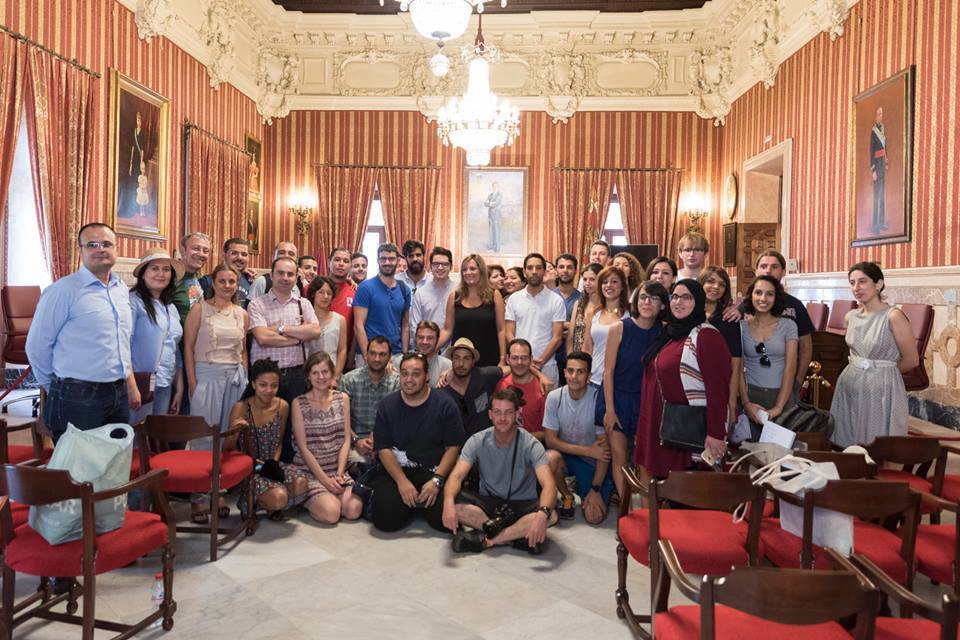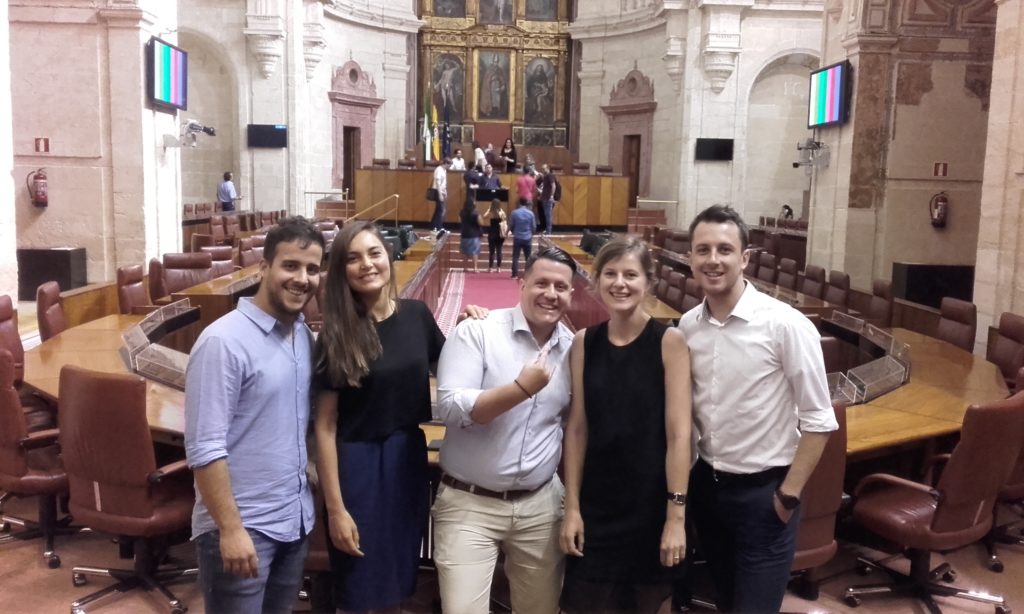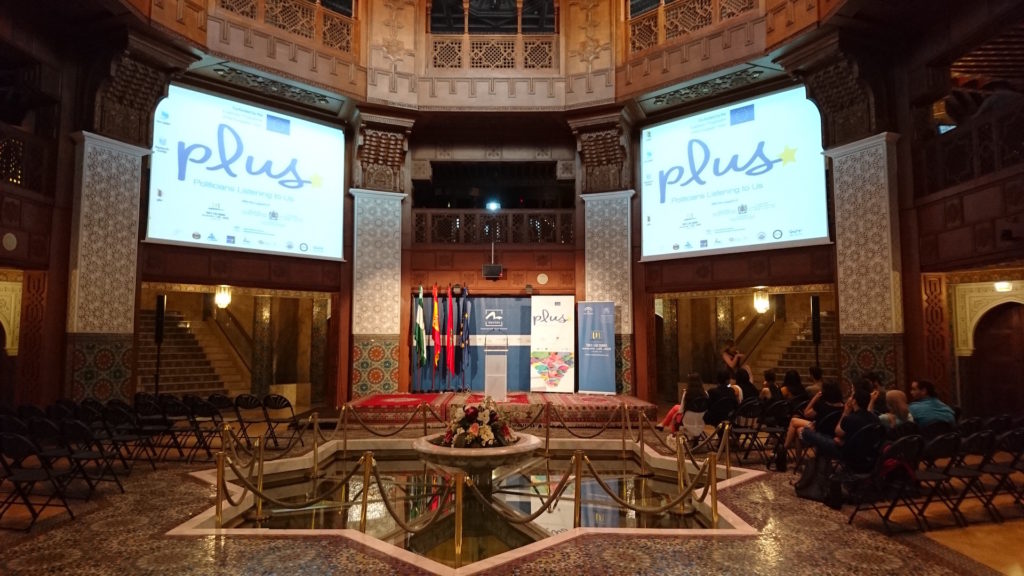PLUS project is a consortium of  European countries and southern Mediterranean neighbours (Euro-Mediterranean partners) – Belgium, Egypt, France, Israel, Italy, Morocco, Portugal, Tunisia and Turkey – represented by youth associations and NGOs that work directly with young people. PLUS project is an initiative led in Spain by the Three Cultures of the Mediterranean Foundation and pertains to Key Action 3 of the Erasmus+ programme. That action focuses on dialogue between young people and policymakers, the aim being to have young people’s voices and opinions heard when political decisions are made. We are very pleased and honoured to have been given the opportunity to participate in the PLUS (Politicians Listening to Us) project.
European countries and southern Mediterranean neighbours (Euro-Mediterranean partners) – Belgium, Egypt, France, Israel, Italy, Morocco, Portugal, Tunisia and Turkey – represented by youth associations and NGOs that work directly with young people. PLUS project is an initiative led in Spain by the Three Cultures of the Mediterranean Foundation and pertains to Key Action 3 of the Erasmus+ programme. That action focuses on dialogue between young people and policymakers, the aim being to have young people’s voices and opinions heard when political decisions are made. We are very pleased and honoured to have been given the opportunity to participate in the PLUS (Politicians Listening to Us) project.
The group of PLUS project participants comprises 50 young people from 20 to 30 years old with diverse educational backgrounds. They are clearly committed to dialogue with policy‐makers at various levels, thus showing their willingness to engage is paralleled by greater involvement with a view to creating a better world, raising social and environmental awareness and promoting solidarity, thereby fostering social entrepreneurship to counter unemployment and job insecurity. The social economy has proven to be the formula resulting to be the best solution in employment terms during the crisis years throughout Europe and occupies a priority place on the future agenda of European institutions.
 CFEP at an initial stage, conducted research on the Belgian policies that encourage the social economy as a driving force for long-term sustainable development (at local, regional and federal level) and as a result, after many consultations and contacts with several key stakeholders and politicians at a local, national and EU level, a document was composed about existing subsidies, support offices, seminars, meetings on good practices and other activities regarding the social economy in Belgium. An analysis of the steps and policies taken by European governments and neighbouring Mediterranean countries will serve to create a series of recommendations helping to achieve growth of the social economy as a potential alternative.
CFEP at an initial stage, conducted research on the Belgian policies that encourage the social economy as a driving force for long-term sustainable development (at local, regional and federal level) and as a result, after many consultations and contacts with several key stakeholders and politicians at a local, national and EU level, a document was composed about existing subsidies, support offices, seminars, meetings on good practices and other activities regarding the social economy in Belgium. An analysis of the steps and policies taken by European governments and neighbouring Mediterranean countries will serve to create a series of recommendations helping to achieve growth of the social economy as a potential alternative.
The participation in the PLUS project was a great, educative and constructive experience of exchanging best practices, highlighting examples of successful social enterprise initiatives in each country, and working in a multicultural, multilingual and multiethnic environment, contributing to the development of mutual understanding, trust and tolerance within different groups of people. This international meeting served to pool information on social enterprise gathered beforehand in order to produce a document of recommendations which it will be presented at major gatherings such as European Youth Week and other forums of interest. Among the benefits is enhanced awareness of the notion of social enterprise as a real and possible alternative for young people.
That work was accompanied by visits to major local and regional political landmarks such as the Andalusian Parliament and the City Hall of Seville, the capital of Spain’s largest autonomous community, providing an opportunity to meet, discuss and react with key decision‐makers. We visited the Parliament of Andalusia and we had a very interesting discussion with its President, Mr Juan Pablo Durán. Then we moved to the Regional Government of Andalusia based in the Palace of San Telmo for an informal discussion with the President of the Government, Mrs Susana Diaz. Mr José Roales, General Director of Social Economy in the Ministry of Economy of the Andalusian Regional Government, shared data and impressions with us on social economy in Andalusia. Additionally, we visited Seville’s Ayuntamiento (Town hall) where Mrs Alicia Morillo, responsible of Youth, Gender Equality and Relationships with the University, provided us with in-depth details about Seville and its management. After that, Mr José Antonio Rodriguez Salas, Mayor of Jun (the Spanish town that runs on twitter) came from Granada to discuss with us, at the Three Cultures of the Mediterranean Foundation Headquarters, the Moroccan pavilion, about “horizontal democracy” and communication by using technology and social media (twitter in particular) in small villages.
Then we moved to the Regional Government of Andalusia based in the Palace of San Telmo for an informal discussion with the President of the Government, Mrs Susana Diaz. Mr José Roales, General Director of Social Economy in the Ministry of Economy of the Andalusian Regional Government, shared data and impressions with us on social economy in Andalusia. Additionally, we visited Seville’s Ayuntamiento (Town hall) where Mrs Alicia Morillo, responsible of Youth, Gender Equality and Relationships with the University, provided us with in-depth details about Seville and its management. After that, Mr José Antonio Rodriguez Salas, Mayor of Jun (the Spanish town that runs on twitter) came from Granada to discuss with us, at the Three Cultures of the Mediterranean Foundation Headquarters, the Moroccan pavilion, about “horizontal democracy” and communication by using technology and social media (twitter in particular) in small villages.

